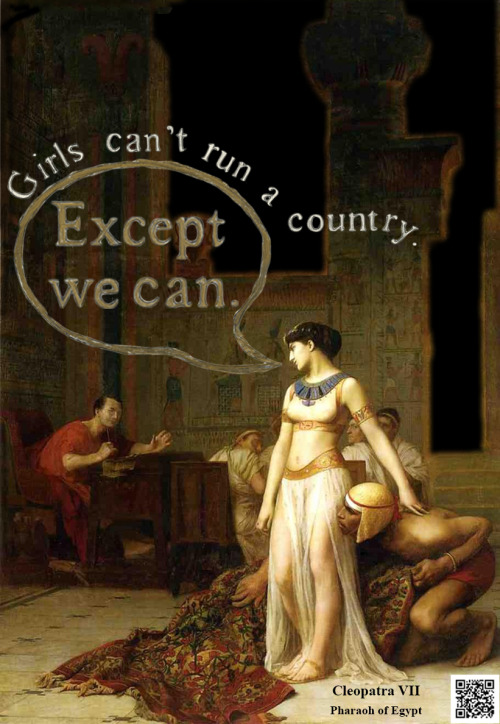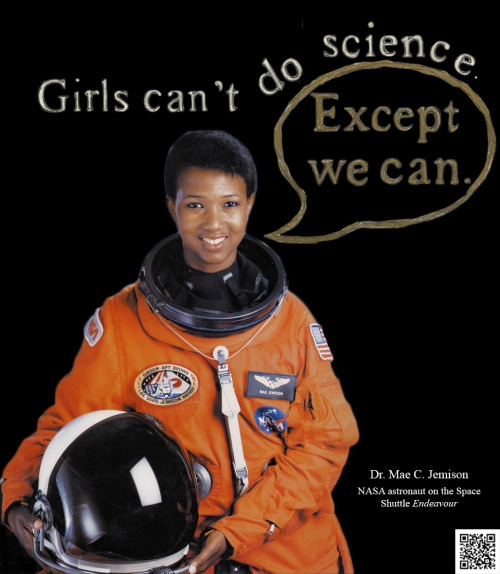This project was posted on tumblr on February 18th, and the CoverGirl Campaign video was posted on YouTube on February 21st, so I'm not suggesting a creative theft here. (Although I don't put it past advertisers. Remember when this art was turned into this ad? Yuck.) "Girls Can" is also the name of an empowerment program for young women in Richmond, Virginia, so I guess it's a popular phrase.
Regardless, the project succeeds where the CoverGirl ad fails. Instead of painting girl power with one bubbly brush, it examines societies perceptions of women in positions of power.
There are some strong criticisms of the above work, namely that the chosen picture of Cleopatra upholds historical whitewashing and that Aung San Suu Kyi is overseeing a massacre of Muslims in Burma. The author admits that not all these women are feminist icons, but points out that the project is more to show how our perceptions of the capabilities of women are fucked up. In my opinion, this makes the work more interesting. Not only is this project more diverse than the CoverGirl ad in terms of women of color and the jobs the women do, but opens up a great dialogue about how we define feminism, who we choose as our feminist icons, and how we reach for feminism in a corrupt and difficult world.
When we were little we thought all feminism was Spice World and Hillary Clinton. Then we grew up, put on our big girl panties, and started learning that hard lesson that not all women in positions of power are feminists.
A very clear example of this is Sarah Palin. During the 2008 presidential campaign Palin was at times paraded by the GOP as a feminist in an attempt to pander to women voters, presumably because she was a women in a position of power, gearing up to a women in a very high position of power. But any women who denies reproductive rights to other women is not a feminist.
TERFs (Trans-Exclusionary Radical Feminists), women who don't believe that transwomen should have rights and actively work to deny transwomen those rights are not feminists.
Queen Rania of Jordan, who is loved in the West for being fashionable but disliked by the people of Jordan and compared to Marie Antoinette? Not really a feminist.
Katy Perry, who fetishizes Japanese women and appropriates their culture? Not a feminist.
Racist women? Not feminists. Women who slut shame? Nope. Homophobic women? Nah. Biphobic women? Fuck off. Women with so much internalized misogyny that they victim-blame? Sure as fuck not feminists.
Sorry. You're kicked out of the club. You don't get to play with the big kids. Change your viewpoints or get the fuck out, but don't you dare try and steal this movement with your bullshit.
(Maybe I'm hating on women too much. You know who else isn't a feminist? Creepy dudes who think that if they show up to a Women's Studies course and talk about how they're phylogenists they will get laid. We see you, and we know you're scum.)
But being in positions of power is more difficult than It's one of the ways in which feminism and international politics studies come to clash: it is near impossible to maintain perfect feminism in a capitalist society. The standards to which we hold individuals acting on behalf of themselves are different than those to which we hold individuals acting on behalf of countries or corporations. The standards of ethics are different because we expect that politicians are acting not as themselves, but as figureheads for international diplomacy. (Read the play Aunt Dan and Lemon by my boy Wally Shawn if you want to get fucked in the head on that front.)
Continued in Part 2



No comments:
Post a Comment